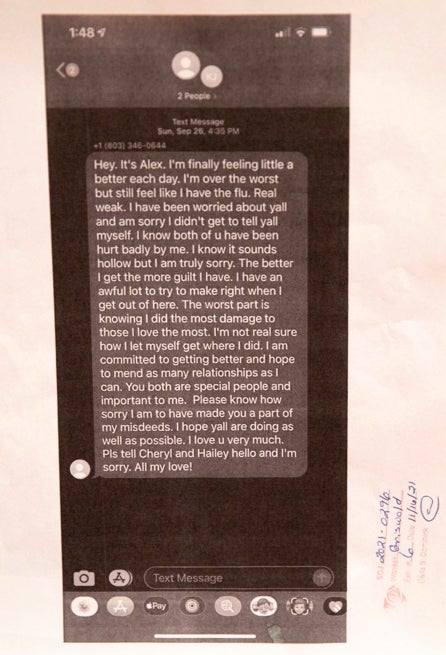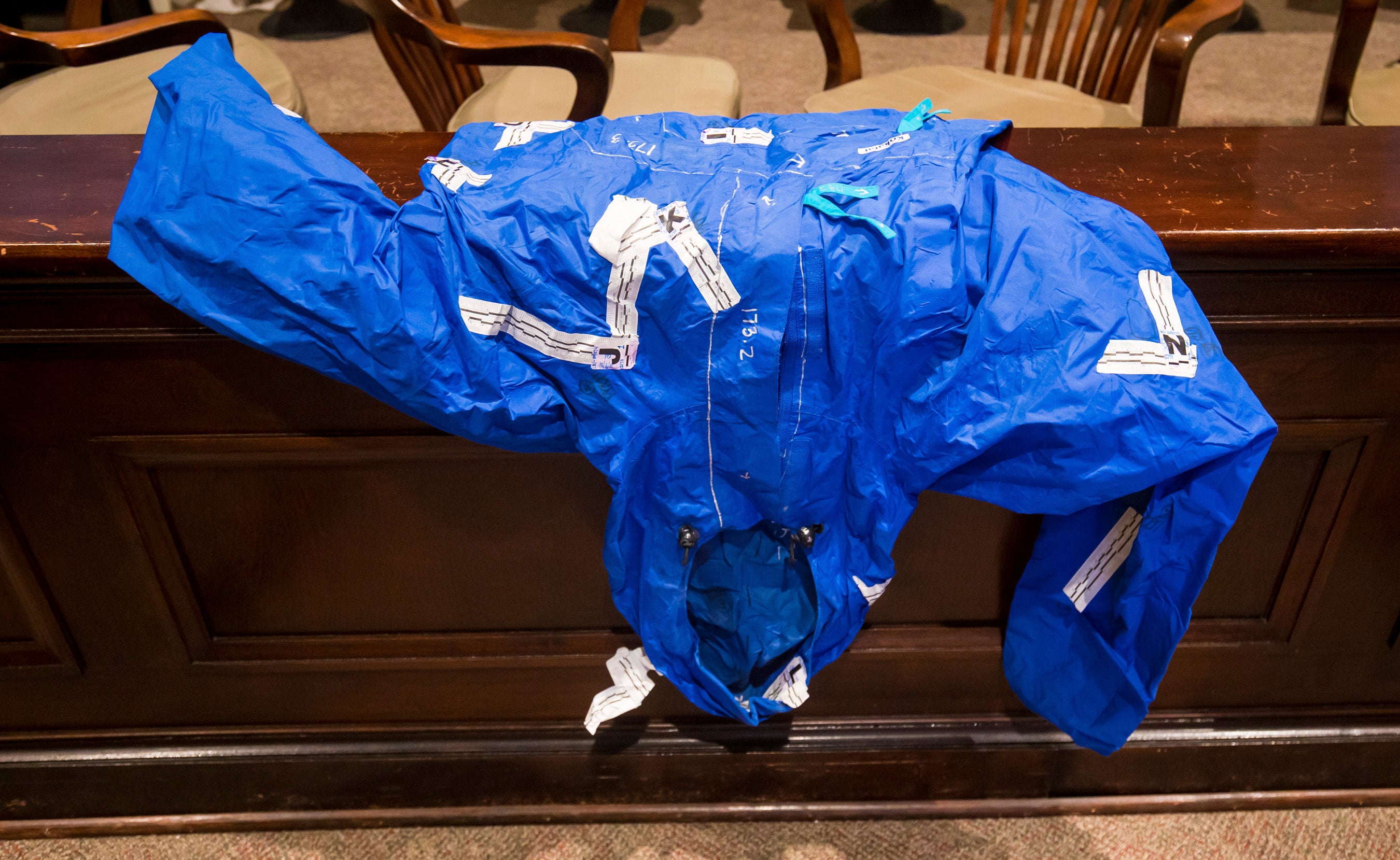
Data taken from Alex Murdaugh’s car has offered a potential timeline for his movements on the night of the murders – and suggests holes in the alibi he gave to his mother’s caregiver.
FBI electronics engineer Dwight Falkofske took the witness stand on Wednesday afternoon, topping off a dramatic day in Mr Murdaugh’s murder trial where Colleton County Courthouse was plunged into an emergency evacuation because of a bomb threat.
Mr Falkofske testified that he extracted data from the onboard computer system of Mr Murdaugh’s 2021 Chevrolet Suburban, including call logs, contact lists, some location data and the “state” of the vehicle in terms of when it was turned on, when it was in and out of park mode, and when the doors were opened.
The data offers jurors a timeline for the vehicle’s movements – and therefore its driver Mr Murdaugh’s movements – on the night of 7 June 2021 when his wife Maggie and son Paul were shot dead on the family’s 1,700-acre estate in Islandton.
The data indicates that Mr Murdaugh did leave his family home and drove to visit his sick mother at around 9pm.
However, it also indicates that he only stayed at his parents’ home for around 20 minutes – and not the 30 to 40 minutes his mother’s carer Shelly Smith testified that he had told her to tell authorities after the killings.
At 9.04pm, Mr Murdaugh’s car system started up and it moved out of park mode two minutes later at 9.06pm, according to the data.
The SUV was put back into park mode at around 9.22pm.
This appears to align with Mr Murdaugh getting in his SUV at his estate on Moselle Road and making the 16-minute drive from his home to his parents’ home in Almeda.
During emotional testimony on Monday, Ms Smith told jurors that a “fidgety” Alex Murdaugh showed up at his sick mother’s house between 8.30pm and 9.30pm that night – something she said was “unusual” for him to do.
A few days after the murders, she testified that Mr Murdaugh spoke to her about his visit that night, telling her to say he had been there “30 to 40 minutes.” She testified that this was incorrect and he had only been there 20 minutes.
The car data reveals that, at 9.43pm, Mr Murdaugh’s car moved out of park mode – 21 minutes after it went into park.
The records then show the SUV going into park mode again at 10.01pm – around the time he said he arrived back at his home and found Maggie and Paul weren’t there. The car goes in and out of park mode twice.
Four minutes later at 10.04pm, the vehicle comes out of park mode again.
At this time, Mr Murdaugh claims that he set off in his car to the dog kennels to try to find his wife and son.
On arrival – one minute later – Mr Murdaugh claims he found the two victims dead from multiple gunshot wounds.
At 10.07pm, he placed a dramatic 911 call where he cried and sobbed on the phone.
The car went back out of park mode at 10.11pm – when Mr Murdaugh told the 911 dispatcher that he was going back to his house to get a shotgun – and back in, out and in again over the next two minutes – as he drove back to the kennels where he was met by law enforcement officers minutes later.

Mr Falkofske testified that the data does not prove when the car was moving or what its location was but said that it shows when it was and wasn’t parked.
However – together with cellphone data, videos and testimony – the car data is key to the prosecution building a detailed timeline of when Mr Murdaugh allegedly murdered his wife and son, and how he quickly sought to build an alibi to cover his tracks.
Under cross-examination on Thursday morning, the defence sought to pick holes in the theory that Mr Murdaugh tossed Maggie’s phone along Moselle Road.
Mr Falkofske confirmed that Maggie’s phone did not connect to Mr Murdaugh’s SUV that night.
If a phone has previously connected to the vehicle’s system, it will automatically connect, he said.
Maggie’s phone was found along the side of Moselle Road on 8 June 2021 with the state suggesting that Mr Murdaugh tossed it out of his vehicle.
The defence and prosecution have already sparred over this theory based on when the phone last registered movement.
The testimony about the car data came at the end of a dramatic day in the double-murder trial when the courthouse was suddenly evacuated due to a bomb threat.
The bomb threat came in to staff at Colleton County Courthouse just before 12.30pm ET on Wednesday, prompting a sudden evacuation of the entire building.
Multiple sources told FITS News that the threat was called in from Ridgeland, South Carolina, and came from a prison inmate.
By 2.30pm the threat was marked all-clear and testimony resumed at around 3.10pm.
The evacuation came after jurors heard testimony about Mr Murdaugh’s alleged financial crimes.

Separate to the murders, Mr Murdaugh is currently facing around 100 charges for stealing almost $8.5m from law firm clients dating back to 2011.
On Monday, the judge ruled that jurors can hear evidence of his alleged financial crimes – as the state seeks to show a motive for the murders.
Michael Gunn, principal of Forge Consulting, told jurors how Mr Murdaugh set up a fake account called “Forge” and impersonated his company so that he could steal money from law firm clients.
Annette Griswold, who worked as a paralegal at Mr Murdaugh’s former law firm PMPED, also revealed how she learned that he had been stealing money from the firm.
Days after his fraud scheme came to light and he was ousted from PMPED, Mr Murdaugh checked into rehab.
Ms Griswold testified that she received a text from Mr Murdaugh in late September 2021 apologising for what he had done. He also sent the text to another colleague.
“Hey, it’s Alex. I’m finally feeling a little bit better each day,” the text message said.
Alex Murdaugh walks into the courthouse before his double murder trial on Wednesday
“I’m over the worst but still feel like i have the flu. Real weak. I’m have been worried about y’all and I’m sorry I didn’t get to tell y’all myself. I know both of you have been hurt badly by me. I know it sounds hollow, but I am truly sorry.
“The better I get, the more guilt I have. I have an awful lot to try to make right when I get out of here. The worst part is knowing I did the most damage to those I love the most. I’m not sure how I let myself get where I did. I am committed to getting better and hope to mend as many relationships as I can.
“You both are special people and important to me. Please know how sorry I am to have made you part of my misdeeds. I hope you are doing as well as possible. I love you very much.”
Jurors also heard more testimony about the “significant” amount of gunshot residue discovered on a blue raincoat Alex Murdaugh allegedly hid in his parents’ home after the murders.
Days after the murders, caregiver Ms Smith testified that Mr Murdaugh showed up at his mother’s house at 6.30am in the morning cradling a “blue something” in his hands. She said he took it upstairs and left it before leaving again.
Prosecutors said that law enforcement found a blue tarp and a blue rainjacket in a search of the home.
SLED forensic scientist Megan Fletcher testified that at least 38 gunshot residue particles were found inside the coat – an amount that fits with the prosecution’s claim he used the garment to hide and move one or both of the guns used in the murders. Another 14 were found on the outside, with 52 in total on the item.
A smaller amount of gunshot residue particles were also found on Mr Murdaugh’s hands, t shirt and shorts and the seatbelt buckle on his car.
Agent Fletcher confirmed that it is not possible to determine how or when the gunshot residue was deposited on the item, with the defence seeking to suggest it could have even been there years.

However she said the evidence is consistent with a recently fired firearm being placed inside the rainjacket.
Maggie and Paul were shot dead on the family’s sprawling 1,700-acre estate in Islandton back on 7 June 2021.
Their murders brought to light a series of scandals surrounding the Murdaughs including unexplained deaths, the multi-million-dollar fraud scheme and a botched hitman plot.
In September 2021 – three months on from the murders – Mr Murdaugh was shot in the head in what turned out to be a botched hitman plot which he had orchestrated with alleged accomplice, distant cousin and drug dealer Curtis Eddie Smith.
Investigations have also been reopened into two other mystery deaths connected to the Murdaugh family after the double murders brought to light a sprawling saga surrounding the once-powerful legal dynasty.
Days on from the shootings on 22 June 2021 an investigtion was reopened into the 2015 death of Stephen Smith, who was found dead in the middle of the road in Hampton County.
The openly gay teenager, 19, had suffered blunt force trauma to the head and his death was officially ruled a hit-and-run. But the victim’s family have long doubted this version of events, with the Murdaugh name cropping up in several police tips and community rumours.
Months later, an investigation was reopened into the death of the Murdaugh’s longtime housekeeper Gloria Satterfield.
She died in 2018 in a mystery trip and fall accident at the family home. Mr Murdaugh then allegedly stole around $4m in a wrongful death settlement from her sons.
Mr Murdaugh, 54, is facing life in prison for the murders. He has pleaded not guilty.







